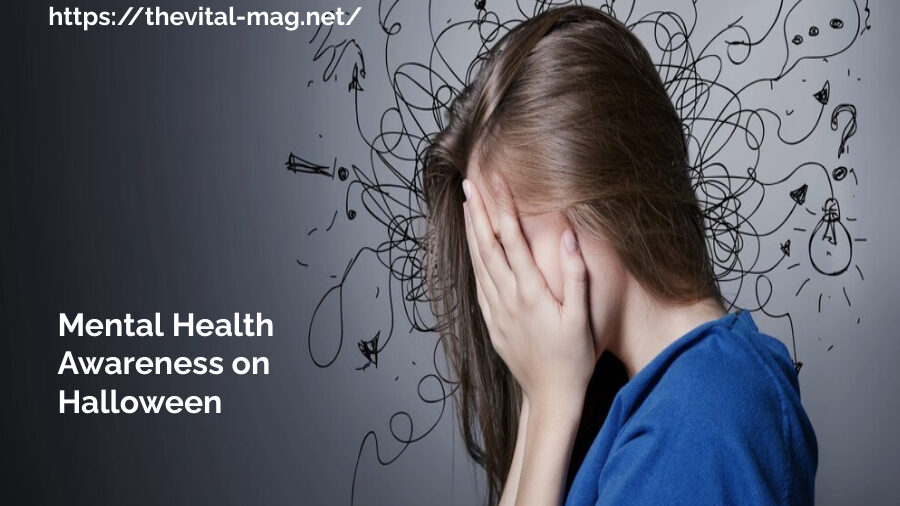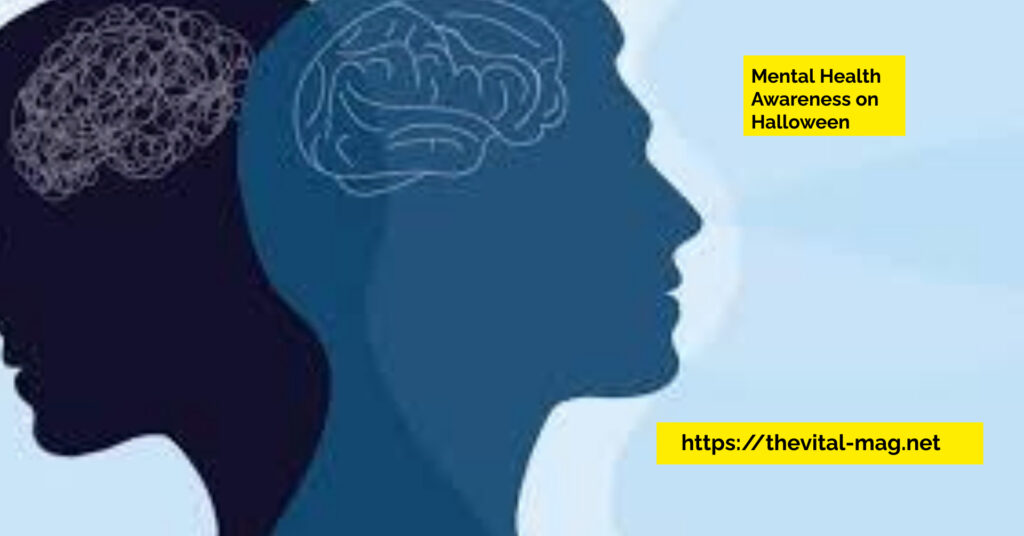Halloween can be a delightful holiday for many people, yet for individuals struggling with anxiety and other Mental Health Awareness on Halloween conditions it can also be stressful and make life challenging. This blog explores this complex relationship by exploring its origins as well as providing strategies and insight on navigating it safely during this spooky season. – Initiation
Mental Health Awareness on Halloween
Halloween can be traced back to Samhain, an ancient Celtic festival which commemorated death and new beginnings.
October 31 marked the end of harvest season and start of winter, leading people to believe that on this date the boundary between living and dead became less distinct; hence why many cultures wear costumes on Halloween to protect themselves against spirits that might wreak havoc in their homes. These traditions eventually lead to Halloween being one of the major global celebrations with over one billion participants celebrating around the globe! [Hilary Clinton]. In addition,
Mental Health Awareness on Halloween
Over centuries, Halloween has evolved from an ancient pagan festival into an enjoyable holiday celebration with trick-or-treating, pumpkin carving and costume parties now all being part of modern celebrations.
Halloween commercialization has grown exponentially over time, with Americans spending about $10 billion each year on Halloween-related activities in the US alone.

Anxiety Related To Mental Health Awareness on Halloween
Common Triggers for Anxiety Associated With Halloween
Loud noises, disturbing decorations and horror themes can be disturbing for some individuals. Flashing lights and crowding spaces can often trigger anxiety disorders;
nearly 19% of adults in the U.S. suffer from anxiety disorders which can become amplified during Halloween festivities. Effect on Different Age Groups
Children: Fear of costumes and unexpected scares.Mental Health Awareness on Halloween Teens: Peer pressure to engage in scary activities. Adults: Memories triggered by Halloween elements. Section 3: Children and Anxiety
Reactions to Mental Health Awareness on Halloween

Parental Strategies
Many children find Halloween costumes and decorations intimidating, while changes in routine or overstimulation can add additional anxiety. For optimal success on Halloween night, parintire Strategies Talk with children beforehand about what is expected, whilst selecting non-frightening costumes/decorations.
Plan soothing Mental Health Awareness on Halloween
activities such as reading light-hearted Halloween books. Safe Celebrations for Children * Arrange small gatherings with familiar friends and family, creating safe Halloween events like pumpkin painting or cookie decoration activities that provide amusing and safe Mental Health Awareness on Halloween experiences for your little ones.
Daylight trick-or-treating may help to alleviate fears.
Mental Health Awareness on Halloween

Adults and Anxiety
Adults’ Experiences of Halloween* For adults suffering from anxiety disorders like PTSD or post traumatic stress disorder (PTSD), Halloween can be especially daunting and stressful.
* Statistics reveal that 3.6% of U.S. adults suffer from Post Traumatic Stress Disorder, which can be triggered by Halloween-themed elements. To manage stress effectively: * Plan ahead in order to avoid overwhelming situations; and
practice self-care techniques like meditation or exercise as self-care practices.
To decrease triggers and anxiety on Halloween, adults can share real-life experiences of navigating it successfully to provide insight and comfort for others.
Example: One adult living with posttraumatic stress disorder found relief volunteering at a local shelter on Halloween night.
Section 5: Mental Health Stigma Stereotypes in Mental Health Unfortunately, Halloween portrays mental illness negatively by emphasizing themes such as haunted asylums or crazy costumes as its main focus.
Problematic Attractions and Costumes Mental Health
These depictions contribute to stigma surrounding mental health conditions.
Attractions such as insane asylums perpetuate harmful stereotypes while costumes that mock mental health conditions continue to be sold despite public protests.
Public Response and Results
Protests have led to the cancellation of offensive attractions at Knott’s Berry Farm such as an asylum theme. Ongoing advocacy efforts must continue for respectful representations.
Positive Change / Inclusive Events for more information on inclusive events.
Communities should promote inclusive events for all, such as sensory-friendly Halloween parties. An example would be The Teal Pumpkin Project which provides non-food treats for children living with allergies and other conditions. Non-Stigmatizing Themes
Promoting themes that do not rely on fear-inducing stereotypes about mental illness, like historical figures or popular book characters can promote a more inclusive environment. Community Awareness By informing the community about stigmatizing themes, educational efforts may lead to more inclusive spaces.
Hosting workshops or information sessions on mental health.
Mental Health Awareness on Halloween
Advocacy and Support
Promoting Change Individuals can advocate for respectful Halloween celebrations that include all its participants
Reaching out to event organizers and retailers directly in order to voice concerns over themes with stigmatizing themes. Support Organizations National Alliance on Mental Illness (NAMI): Provides resources and support for people living with mental health conditions.
Mental Health Awareness on Halloween
Mental Health America (MHA) offers educational materials and advocacy opportunities. Engaging Readers Promoting local or online advocacy groups. Supporting campaigns promoting mental health awareness. Conclusion In conclusion, Mental Health America offers educational materials and advocacy opportunities. Veroffentlichung for MHA may vary by country of residence and advocacy opportunities may also vary significantly between them..
To summarize and highlight key points discussed regarding Halloween’s impact on mental health.
Encouraging readers to approach Halloween mindfully and sensibly. Involving community input.
Engaging readers to share their own experiences and tips for having a healthy Halloween experience.
Additional Resources
Mental Health Awareness on Halloween
Mental Health Awareness on Halloween The Haunted Self: Structural Dissociation and Chronic Traumatization Treatment,” by Onno van der Hart; and, “Scared Sick: Childhood Trauma’s Role in Adult Diseasetrauma’s effect on adult health conditions.
FOR Research highlights the benefits of mindfulness and grounding techniques.
Community Stories Individual Accounts This section includes individual stories from individuals in our community about their Halloween experiences and coping mechanisms.
For instance: One mother shares how they turned Halloween into an enjoyable and worry-free experience for their child.
Creative Alternatives
Here are a few ideas for non-scary Halloween festivities such as themed movie nights or crafting parties, along with Social Media Campaigns and Awareness Initiatives that support non-scary celebrations such as this.
Promoting campaigns that raise mental health awareness during Halloween, such as MentalHealthHalloween. Encouraging participation and sharing positive messages on social media. Virtual Celebrations
Establish virtual costume contests or Zoom parties as ways of commemorating Mental Health Halloween.
Offering virtual spaces to those who prefer celebrating Halloween at home. Practical Tips Preparation * Planning an effective, Mental Health including setting boundaries and prioritizing self-care. Mindfulness Techniques to Help Keep Calm
Employ techniques like deep breathing, meditation and grounding exercises to stay calm while participating in Halloween activities.
Coping Mechanisms
Stress Relief Mental Health Awareness on Halloween
Take measures such as engaging in hobbies or physical activities or reaching out for support from trusted sources in order to combat stress relief.
Stress Management. Mental Health Awareness on Halloween
Employing tools designed to aid stress management. Support Networks
Discussing the value of having friends, family or support networks as a resource during challenging times. Family Activities Provide inclusive fun family-oriented activities.
Activities to share that are enjoyable for the whole family, such as pumpkin carving, costume making and playing Mental Health Awareness on Halloween -themed games; Mental Health Awareness on Halloween
Engaging Children
Tips on including children when planning Halloween activities. Fun and interactive activities which bring people together – for the whole family to enjoy together! Essentially this means: * Final Thoughts Key Takeaways.
Mental Health Awareness on Halloween
Incorporating mindfulness and inclusivity into celebration.
Positive Outlook
Promoting an inclusive Halloween experience.
Emphasizing the importance of respecting mental health and creating positive experiences.
Mental Health and Halloween Halloween offers us an opportunity to come together in creativity and community celebration. However, it also presents unique challenges for individuals living with mental health conditions; by understanding triggers and offering supportive environments we can make Halloween a positive experience






